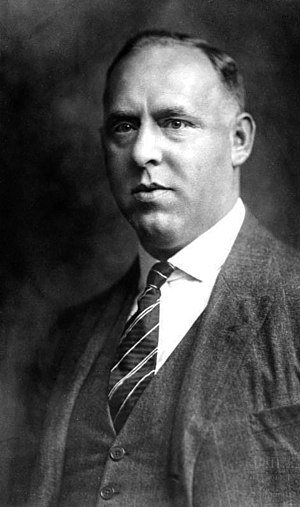Sergei Antonov
Sergei Antonov | |
|---|---|
| Сергей Антонов | |
 | |
| Member of the Duma | |
| In office January 1 1932 – October 23 1940 | |
| Constituency | Svoyev |
| Personal details | |
| Political party | National Slavic Party (1908-1929) Slavic Union Party (1929-1933) People's Legion (1933-1940) |
| Education | Adrikagorod University (Now Nikifor Osipov University) |
| Military service | |
| Allegiance | Slavic Union |
| Branch/service | Grand Slavic Army |
| Years of service | 1902-1908 |
| Unit | 7th Osipovgrad Infantry Regiment |
| Battles/wars | Ledyanaya War |
| Awards | Order of Saint Michael |
Sergei Antonov (Slavic: Сергей Антонов; August 22, 1876-November 13 1949) was an early prominent Slavic Union Party (PSS) official and politician who was instrumental in Nikifor Osipov's early rise to power. Antonov served in the Ledyanaya War and rose to the rank o f lieutenant. He met Osipov in 1915 and quickly realized his potential. He joined Osipov's Slavic Union Party in 1929, rising to second in command and pulling a lot of the strings that would lead to Osipov's rising popularity.
Despite all this Antonov had many ideological differences with Osipov, being much more extremist than the eventual Vozhd. In 1933 he would attempt to seize power within the PSS, eventually losing and being expelled from the party, him and several of the most extreme members would form the People's Legion, which wouldn't have much success, eventually being banned in 1940.
Early Life
Antonov was born August 22, 1876 in Noyalensk, Slavic Union to a wealthy family, his father, Viktor Antonov, was a lawyer. Antonov would follow in his fathers footsteps and receive a law degree from Adrikagorod University (Now Nikifor Osipov University). The Ledyanaya War broke out June 21 1901 and Antonov would enlist in the Grand Slavic Army due to his father believing that his son fighting in the war would help him in his run for office.
Antonov was apparently a good soldier, rising to the rank of lieutenant and winning the Order of Saint Michael, though some believe that a lot of this success was due to his political connections, and some alleging that he never even saw front line combat.
Political Career
After the war Antonov would continue to practice law, and in 1908 he joined the National Slavic Party, what was then the nations leading conservative party. He would become involved in politics, donating heavily to conservative politicians. He met Nikifor Osipov in 1913, who was already a war hero and beloved by the Slavic people. Antonov quickly realized that if utilized correctly Osipov's popularity could lead to great power, but Osipov had no interest in politics at the time.
When the Slavic Civil War broke out Antonov fled south. In 1929 once the conflict had ended he was approached by Osipov to assist him in the creation of the Slavic Union Party, to which Antonov quickly agreed. The party grew quickly, with Antonov serving as Osipov's second in command and the parties minister of propaganda, building the basis of what would become Osipov's cult of personality.
As the years went by Osipov grew colder towards Antonov, leading him to believe that Osipov intended to kick him out of the party. Antonov responded by attempting to take control, though he would eventually fail. Antonov and the more radical members of the party would leave to form the People's Legion, which achieved little success.
In 1940 the Slavic Union Party would be made the only legal party in the Slavic Union by Nikifor Osipov, forcing Antonov out of politics.
Later Life & Death
While not banned from holding office he was essentially blacklisted, and even if he wasn't he likely wouldn't have rejoined the Slavic Union Party out of a sense of pride.
Antonov spent his last years writing several books, the most well known of which is Krov' naroda (Slavic: Blood of the People) which completely laid out his beliefs, and is a very popular text among Krovists. He also wrote several fiction books about about a possible future where the Slavic Union had conquered vast amounts of lands. These books were criticized as unrealistic, and the leader of this fictionalized version of the Slavic Union was commonly criticized as a self insert character.
In 1949 upon the breakout of the World War he offered to lead a Slavic volunteer regiment in support of the League Powers, this offer was refused and he would die a few months later of a heart attack.
Written Works
Krov' naroda
The Empire of the Slav
From the North to Toyana
The Barbarians from the South
Power of the Atom